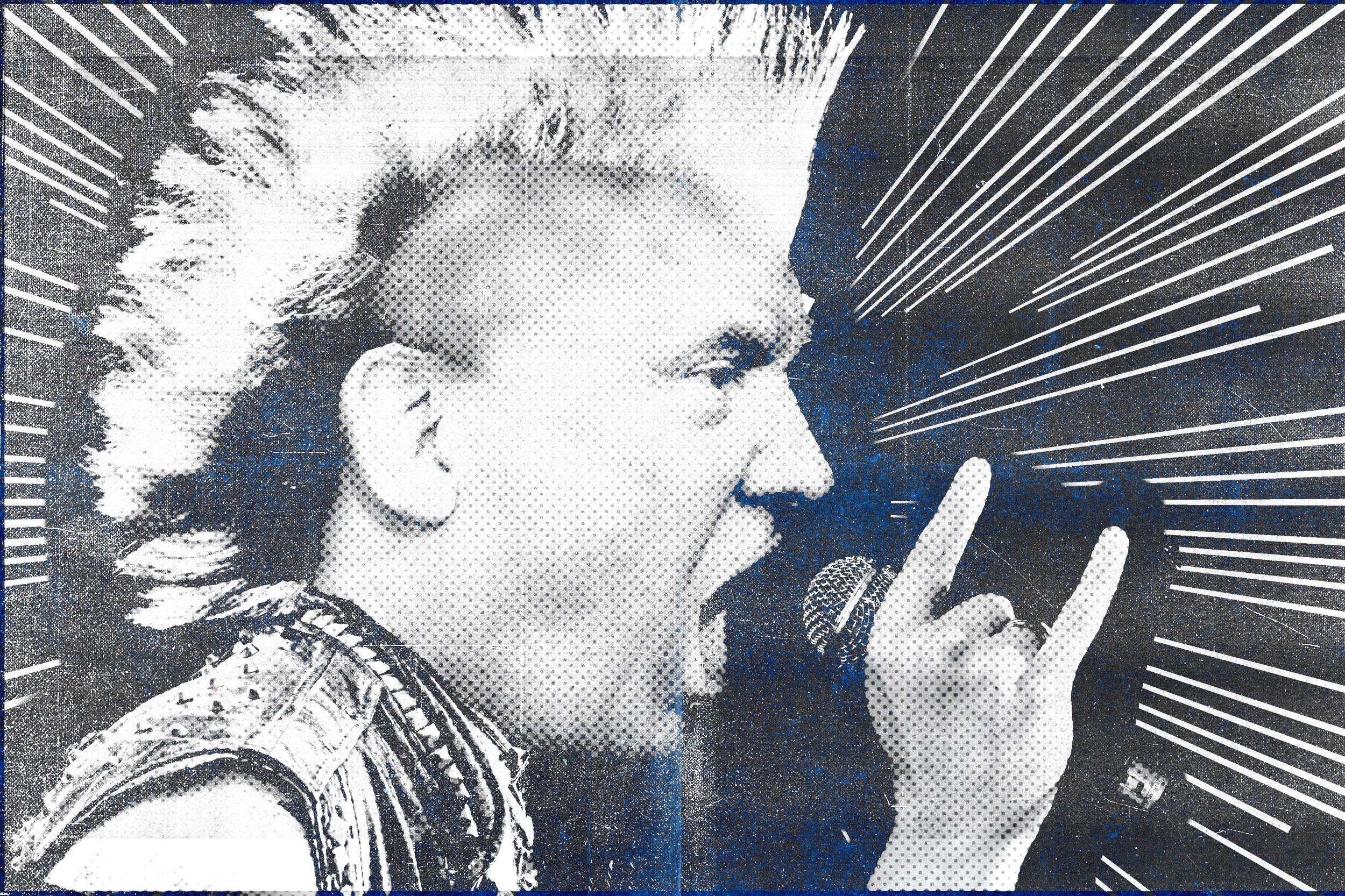
We’re seeking solace where we can find it right now, in fiercely declared new directions and comforting old ideas. This one is a little of both.
“Punk rock thrives under Republicans” is a historically fun idea with a thorny 21st-century track record. In the aftermath of the 2000 Bush-Gore debacle, Fat Mike — he of L.A. pop-punk legends NOFX, they of gleefully puerile records like 1996’s Heavy Petting Zoo — started the activist organization Punkvoter. His reasoning: “I felt that if I had spoken out to my fanbase more and tried to tell them how I felt politically, it might have made a difference, especially because NOFX has sold 50,000 records in Florida.”
That quote has stuck with me — the audacity of hope in that logic, that it’s a math equation, that all this requires is identifying those faithful to your art and converting some modest percentage of those people to your politics. It made sense in theory; it still does. Punkvoter registered thousands of voters and shepherded two Rock Against Bush compilations; NOFX named their 2003 record The War on Errorism. Bush won reelection anyway, and by 2012 Fat Mike had thrown up his hands and disbanded the organization.
The music that emerged from this period hasn’t aged terribly well. Punk rock, of course, is far more establishment than antiestablishment now, just as it was then. It’s the old, comforting idea, not the fierce new call to action. Other genres — including rap, somewhat incredibly, given that it’s basically punk’s age — are far more visible and vibrant and capable of jolting more people out of their complacency with more invigorating violence. But whatever your taste, there are too few genuinely memorable and highly (or at least widely) regarded anti–Iraq War songs anywhere. None have remained lodged in the public imagination at quite the same toxic level as Toby Keith’s supremely knuckleheaded carpet-bomb jam “Courtesy of the Red, White and Blue (The Angry American),” at least. The culture that thrived during the George W. Bush administration wasn’t necessarily more escapist than usual, but largely escapist it remained. Whether you reached for 50 Cent or Nickelback, Nelly or Creed, the White Stripes or Britney Spears, what emerged was the sense that while protest music hadn’t died out entirely, it was, with notable but too few exceptions, no longer popular music. What once served as an invaluable Trojan horse was now just another battering ram.
Still, you’ve got to think some of the people Punkvoter recruited are still voting. Or at least that was my hope on election night 2016, the margin in Florida once again razor thin. It didn’t work out the way Fat Mike likely wanted, now as then. But a losing effort is not the same as a pointless one.
The threat is different today, with President-elect Trump already loading up his administration with old right-wing warriors and terrifying new strains of racism, anti-Semitism, and anti-immigrant malevolence. This goes beyond a mere political defeat; for many of us, the cultural climate and the national mood turned six shades darker overnight. The tools we use to confront this threat must be different, too. We need new languages. Political, emotional, cultural. More, and better, battering rams and Trojan horses both. What worked in 2002, even as consolation, might not now.
It’s tempting to desperately comb history for evidence that culture viscerally changed in response to the George W. Bush administration and all the progressive lamentations those years entailed. That art became harder, grittier, more serious, more explicit in its calls to action. Green Day offered up American Idiot; Hurricane Katrina and its bumbled aftermath inspired a pretty good song on one of Jay Z’s worst albums; Eminem served up the grim pre-2004-election dirge “Mosh”; Neil Young wrote a song called “Let’s Impeach the President.”
It’s tempting to think all that toughened-up culture, in turn, changed us, and helped raise up Barack Obama in its wake. You could regard The Wire, for example, as hyper-realism that opened a certain strata of white liberal America’s eyes to the absurdity and futility of the war on drugs. Or you could dismiss that notion as retroactive bullshit: The show is far more popular and highly regarded now than it was, and for many who loved it in its time, the show was escapism. It took our minds off the very real-world problems that inspired it and were meant to inspire us. Even indisputably great art often falls short of qualifying as great activism. And how long will it take, in a radically accelerated and more instant-reactionary cultural climate, to publicly launch a radical post-Trump project of that magnitude? Still years? Or will mere months suffice now, given the improved means of production and the reanimated purpose of the artists controlling them?
The most consequential cultural protests of the George W. Bush years weren’t technically works of art at all. Two in particular tower above the rest: Kanye West blurting out “George Bush doesn’t care about black people” during a 2005 Hurricane Katrina fundraiser, and Dixie Chicks singer Natalie Maines assuring a London crowd that “we’re ashamed that the president of the United States is from Texas” as the Iraq War was unfolding in 2003. The vicious backlash to the Dixie Chicks nearly ruined their careers and certainly altered their trajectory for good; Kanye’s arc since then is more complex, given that a few years later it would be a U.S. president calling him a jackass, not the other way around. Maybe art doesn’t get genuinely political until it’s willing to forfeit the comforts of art altogether. In the near future, maybe albums will just serve as promos for sneak-attack PR campaigns.
In either case, no song or album or TV show or movie from the 2000s can compare, whether that’s “When the President Talks to God” or American Idiot or The West Wing or Fahrenheit 9/11. It’s not that nobody tried: If Green Day or Eminem didn’t do it for you, maybe Merle Haggard’s antiwar dart “That’s the News” or Randy Newman’s typically acerbic “A Few Words in Defense of Our Country” or Lil Wayne’s Katrina-inspired mixtape cut “Georgia … Bush” did. But that last one brings up a different problem: Wayne’s complicated feelings now about Black Lives Matter — as expressed on Nightline, not on a mixtape or, God forbid, an official album release — suggest that the meaning of these things rarely stays fixed in time. The more precise an artist is in articulating your feelings, the more betrayed you might feel later when your feelings no longer precisely align with theirs. Vaguer and broader might be better.
Stuff this serious just doesn’t translate, which might explain why every “This feels like a Black Mirror episode” tweet on election night only made Black Mirror feel obsolete. Where does Tuesday night rank on the official Bleakest Black Mirror Episodes list? (Much better than “White Bear”; far worse than the especially prescient “The Waldo Moment.”) Do we regard the episodes that are less terrifying than our current reality as failures of imagination we can no longer afford to indulge? And shouldn’t the effort you’d expend imagining ways that things could be worse now be redirected toward trying to make the real world incrementally better?
The problem with dogged realism is that the worse the facts get, the less excited we get about letting those facts inform our fiction. As the spotty box office history of Iraq War movies has shown, nobody wants to watch a war movie about a war we’re currently fighting (and losing). There’s no immediate reason to think that the coming Trump administration culture wars — whether the battleground is abortion or legalized marijuana or whether science should be taught in schools at all — will be different. They might drive us all out of our shells, our protective bubbles. They might drive us even deeper into them.
But there is comfort, and power, in escapism too. Chance the Rapper’s Coloring Book certainly doesn’t feel like work, or homework, or dense speechifying. But in its defiant, infectious, grinning-in-the-face-of-calamity joy, it might qualify as the most powerful political statement of 2016. The silly Rosie-the-Riveting-Stoner anarchy of Broad City can be just as galvanizing as the soft, elegant self-care anthems of Solange’s A Seat at the Table. “I can live” is just as vital and political and invigorating a statement as “Can I live?” Many of those examples are cocoons, of course, safe spaces increasingly at odds with the danger lurking just outside them. We likely need more outright fury now; it may be time to renegotiate how many moments of peace the culture wars to come can comfortably support. But it’s also worth asking whether curling up in the fetal position can be a sort of Trojan horse too. It all depends on how you’ve changed when you stand up again.
Irony didn’t die on 9/11, and it didn’t on 11/9, either. The Onion and its offshoots, as always, are already pointing the way forward for those inclined to fight fire with fire emoji. The vanguards of modern comedy that attempted to confront election night in real time — from Stephen Colbert to Desus & Mero — got caught flat-footed, chortling into a void much larger and colder than they could’ve possibly imagined. But they’ve got a chance to regroup and retaliate with either less childlike absurdity or, just as effectively, more.
Same deal with your Samantha Bees and John Olivers, who’ll seek to break free of the liberal-media echo chambers blunting their impact. The Eviscerators might have the most vexing challenge of all — they rose to power in the past few years by pairing pointed, hysterical-in-multiple-senses wit with righteous indignation, laughing through tears of rage. But the bind here is that the angrier they get, the less likely the targets of that anger — which now comprise just a little less than half the country — are willing to hear it. Reaching across the aisle has never been harder, or more necessary. Tousling Trump’s hair is clearly not the right approach. But lighting his wig on fire might not work, either. It’s less about soothing and invigorating the faithful now than it is about expanding their numbers. We need more catharsis now, of course, but also many, many, many more converts.
Saturday Night Live will likely be a key battleground, as usual, with the usual high points (like Dave Chappelle this past weekend) and low moments (like, yes, Donald Trump himself hosting a year ago). The show’s been hit-and-miss this year, unsure whether to play the election as slapstick comedy or as a shitty, low-budget Hollywood remake of Greek tragedy. But in terms of staring down the absolute worst that troll-clogged 2016 has to offer and laughing maniacally, your champion going forward is Leslie Jones, who lambasted the hackers who released her nude pictures thus: “If you wanna see Leslie Jones naked, just ask!”
More than 60 million people in this country don’t regard this election outcome as a tragedy at all. It’s hard to imagine what it would take to trigger another Dixie Chicks moment, or if one is even possible now. What could anyone possibly say about Donald Trump that hasn’t already been laden with expletives and shouted from every rooftop? Did all that enmity only galvanize him, and cause his staunchest supporters to dig in ever deeper? True racists are pleased, rather than shamed, when called out as such. We might need new insults too.
But it’s terrifying to imagine what the response might be if anyone actually rattled him now. The realms of governmental and corporate power alike are rife with the potential for censorship — it happened on the radio after 9/11, and that was relatively well intentioned. An emboldened Trump was petulantly calling out journalists by name at his rallies even before this sweeping coronation; what’s to keep him from doing the same to, say, rappers? The last few weeks of the election turned into a referendum on the lyrics of Jay Z, Beyoncé, and Nicki Minaj, after all. For those committed to fighting back, it will require enormous bravery just to do what this moment seems to require, however absurd a form that civil disobedience might take.
If the election result horrifies and depresses and enrages you, the specific song that speaks to you or merely keeps you upright for a few hours might be pointed in its fury (yes, YG’s “FDT,” now and forever) or bear-hug broad in its rousing call for unity (Kendrick Lamar’s “Alright,” then and now). Woody Guthrie. Bob Marley. Nina Simone. Killer Mike. Beyoncé. Your chosen spirit guides might address your despair, obliquely or directly; they might offer pure escapism, eschewing despair entirely. Anger, joy, whimsy, resilience. Whatever works, or whatever might. Because it might not help right now, but it might again, soon.
This is where I landed. Ted Leo and the Pharmacists’ “Little Dawn.” Released in October 2004, and a compelling argument that terrible political climates can sometimes inspire pretty baller punk rock. This song got me through the Bush-Kerry election aftermath, particularly the two-minute-long coda where Leo just chants, “It’s alright / It’s alright / It’s alright / It’s alright” with a gentle fervor that, after putting the song on repeat for an hour, you can almost believe. You don’t right up until you do.
From a progressive perspective, it sure as hell didn’t feel alright when the song came out, and it wasn’t alright for a long time, and then it was extremely alright for a long and blissful spell, and then on Tuesday night, it was worse than it had ever felt. But keep this on repeat. The melodramatic wallowing is over, hopefully, for the most part, and now the work will begin. The actual work: the activism, the engagement, the time and money and energy spent on far more important things than plain old entertainment. But there are also forms of play that won’t feel anything like work for a long while, until, with enough repetition, they will grow to feel like some of the most important work of all.

